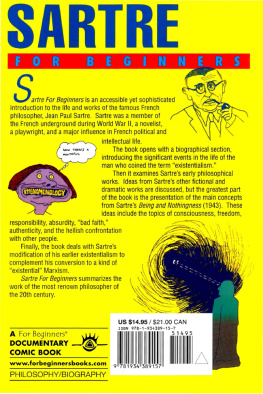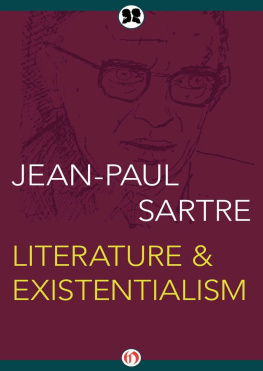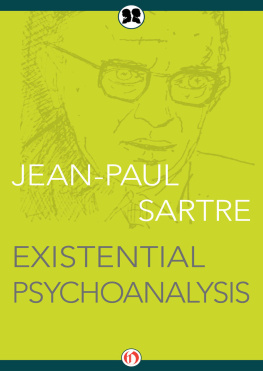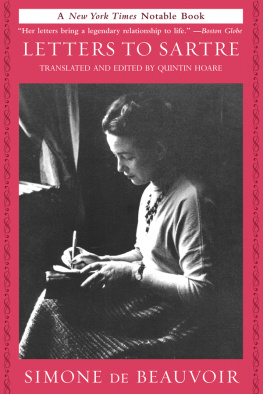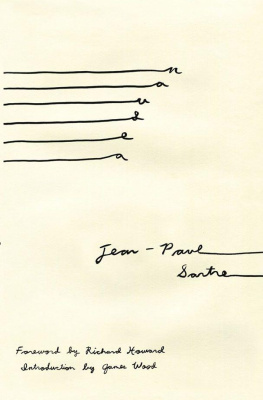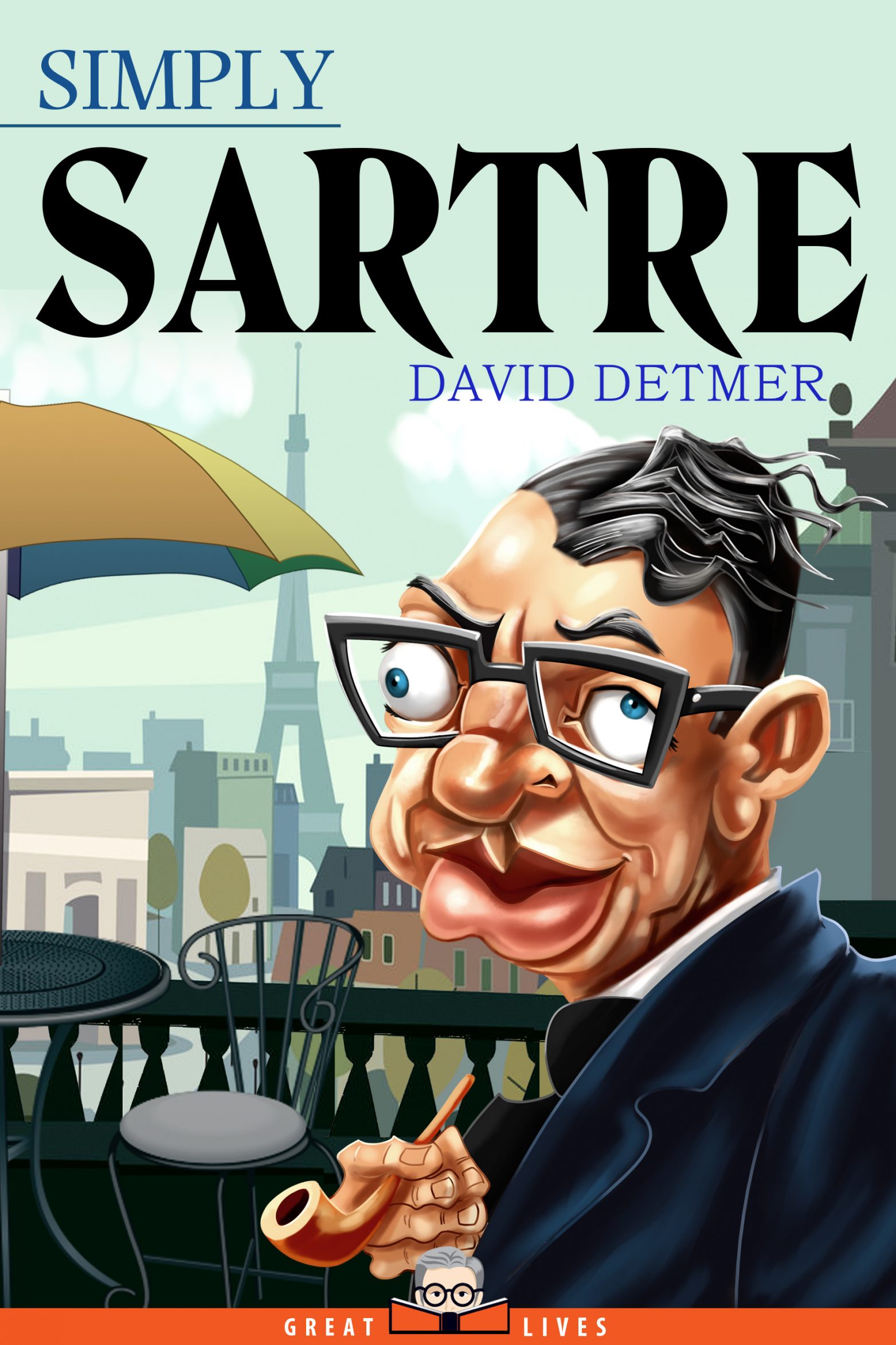Copyright 2020 by David Detmer
Cover Illustration by Jos Ramos
Cover Design by Scarlett Rugers
All rights reserved. No part of this publication may be reproduced, distributed, or transmitted in any form or by any means, including photocopying, recording, or other electronic or mechanical methods, without the prior written permission of the publisher, except in the case of brief quotations embodied in critical reviews and certain other noncommercial uses permitted by copyright law. For permission requests, write to the publisher at the address below.
ISBN: 978-1-943657-43-8
Brought to you by http://simplycharly.com
Contents
Simply Sartre -- Simply Sartre
1
Praise for Simply Sartre
This is a delightful introduction to the life and ideas of Jean-Paul Sartre. Detmers writing is clear, engaging, and fun to read. The book weaves together accurate overviews of Sartres main ideas with convincing reasons these ideas are still relevant today. The book ends with useful summaries of 50 of Sartres worksa perfect roadmap for anyone who wishes to read Sartre himself. If I had to recommend one book to a friend, colleague, or family member on Jean-Paul Sartre, this would be it.
Joshua Tepley, Associate Professor of Philosophy, Saint Anselm College
David Detmers new book will stimulate first-time readers of Sartre , challenge advanced students, and offer political activists as well as scholars much to think about. It demonstrates the clarity of a first-rate teacher and the awareness of Sartre s relevance by someone keenly involved in todays world. Detmer shows a deep understanding of the whole range of Sartre s work, how that work connects with other trends of philosophy, and a fine writers ability to tell a good storyall in a short introduction.
Ronald Aronson, author of Jean-Paul Sartre: Philosophy in the World and Distinguished Professor Emeritus of the History of Ideas at Wayne State University
The task of introducing Sartre is challenging and doing so for a short book is daunting. Detmer triumphs, revealing himself as a premier teacher of Sartres life and philosophy. This accessible and accurate introduction captures how a bookish child became one of the most prominent intellectuals on the twentieth-century world stage and created a legacy that continues to grow well into the twenty-first century. Additionally, with chapters on responsibility, consciousness, and freedom, this introduction conveys the importance and magnetism of Sartres philosophy.
Damon Boria, Associate Professor of Philosophy at Franciscan Missionaries of Our Lady University
As a community college professor, I have longed to integrate Sartres philosophy into the introductory courses I teach, but have struggled to find a good way to do so. Simply Sartre solves the problem all the way around: Here we have a brief, comprehensive, and truly engaging introduction to Sartres alternative takes on issues including the nature of morality, free will and determinism, and the metaphysics of mind and body. Furthermore, it also will require students to consider Sartrean thinking on anti-black racism, sexism, and other forms of oppression. This book is a gift to all instructors who see the value of getting students to take Sartre seriously.
Chris McCord, Professor of Philosophy, Kirkwood Community College
-- Simply Sartre
Simply Austen by Joan Klingel Ray
Simply Beckett by Katherine Weiss
Simply Beethoven by Leon Plantinga
Simply Chekhov by Carol Apollonio
Simply Chomsky by Raphael Salkie
Simply Chopin by William Smialek
Simply Darwin by Michael Ruse
Simply Descartes by Kurt Smith
Simply Dickens by Paul Schlicke
Simply Dirac by Helge Kragh
Simply Einstein by Jimena Canales
Simply Eliot by Joseph Maddrey
Simply Euler by Robert E. Bradley
Simply Faulkner by Philip Weinstein
Simply Fitzgerald by Kim Moreland
Simply Freud by Stephen Frosh
Simply Gdel by Richard Tieszen
Simply Hegel by Robert L. Wicks
Simply Hitchcock by David Sterritt
Simply Joyce by Margot Norris
Simply Machiavelli by Robert Fredona
Simply Napoleon by J. David Markham & Matthew Zarzeczny
Simply Nietzsche by Peter Kail
Simply Proust by Jack Jordan
Simply Riemann by Jeremy Gray
Simply Tolstoy by Donna Tussing Orwin
Simply Stravinsky by Pieter van den Toorn
Simply Turing by Michael Olinick
Simply Wagner by Thomas S. Grey
Simply Wittgenstein by James C. Klagge
3
Series Editor's Foreword
S imply Charlys Great Lives series offers brief but authoritative introductions to the worlds most influential peoplescientists, artists, writers, economists, and other historical figures whose contributions have had a meaningful and enduring impact on our society.
Each book provides an illuminating look at the works, ideas, personal lives, and the legacies these individuals left behind, also shedding light on the thought processes, specific events, and experiences that led these remarkable people to their groundbreaking discoveries or other achievements. Additionally, every volume explores various challenges they had to face and overcome to make history in their respective fields, as well as the little-known character traits, quirks, strengths, and frailties, myths, and controversies that sometimes surrounded these personalities.
Our authors are prominent scholars and other top experts who have dedicated their careers to exploring each facet of their subjects work and personal lives.
Unlike many other works that are merely descriptions of the major milestones in a persons life, the Great Lives series goes above and beyond the standard format and content. It brings substance, depth, and clarity to the sometimes-complex lives and works of historys most powerful and influential people.
We hope that by exploring this series, readers will not only gain new knowledge and understanding of what drove these geniuses, but also find inspiration for their own lives. Isnt this what a great book is supposed to do?
Charles Carlini, Simply Charly
New York City
J ean-Paul Sartre was, perhaps, both the most celebrated, and the most hated writer of the 20th century. On the one hand, no other philosopher of the period was more famous, more widely read and studied, more influential, or more honored (he was awarded, but rejected, the Nobel Prize in literature; and 50,000 people turned out for his funeral). But, on the other hand, he was regularly vilified for political reasons by both the left and right; the Catholic Church placed all of his works on its Index of works that Catholics, on pain of ex-communication, were forbidden to read; several countries officially prohibited performances of his plays; his apartment was twice bombed (and the office of the journal he co-founded was also bombed); and war veterans once marched through the streets of Paris chanting, Shoot Sartre! This book tells the story of the life and work of this extraordinary philosopher, novelist, playwright, biographer, literary critic, journalist, public intellectual, and political activist, focusing on the contemporary relevance of his ideas, which maintain their power to inspire, entertain, enlighten, and enrage.



